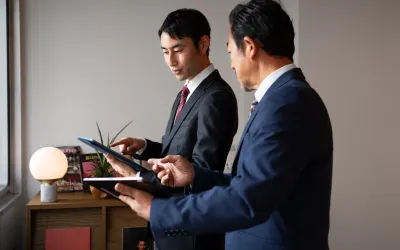
Thinking Fast and Slow: The Psychology of a Successful Interview
In the world of interviews, especially in Japan’s high-stakes pharmaceutical and medical device industries, Daniel Kahneman’s Thinking, Fast and Slow gives us practical insights into how we can think more critically about our hiring choices. By recognizing our fast (System 1) and slow (System 2) ways of thinking, we can better manage our snap judgments and dig deeper into candidates’ true potential.
System 1: The Power of first impressions in Japan.
System 1 is our quick, intuitive side—the one that makes instant impressions. In Japan, first impressions are everything. A candidate’s first moments in the interview room can strongly shape our perception of them, whether it is their polished look, a respectful bow, or even subtle gestures that carry a lot of weight in Japan’s business culture.
But as interviewers, we must keep our fast-thinking System 1 in check. We are human, so first impressions are inevitable. However, acknowledging this bias helps us consciously set aside those initial thoughts and leaves room for deeper evaluation later.
System 2: The value of careful thinking
System 2, on the other hand, is our careful, logical side, the part that digs into a candidate’s experience and skills. In Japan’s pharmaceutical and medical device sectors, where precision and knowledge of regulations are critical, System 2 thinking is invaluable. It lets us go beyond the surface and assess whether the candidate truly understands the job’s technical and regulatory demands.
To really engage System 2, we can prepare structured questions that allow candidates to showcase their problem-solving abilities and industry knowledge. Asking for specific examples from regulated work environments or insights into Japan’s regulatory landscape can reveal the candidate’s depth of understanding. Plus, candidates who come prepared with their own questions show initiative and a genuine interest in the role—a big plus in any interview.
The Halo Effect: Staying fair and balanced
The halo effect is when a strong impression in one area, like technical know-how, makes us think the candidate is outstanding across the board. This bias can be particularly strong in Japan, where consistent professionalism is tied to trustworthiness and can easily lead us to see candidates as “better” than they might actually be.
To avoid falling into the halo effect, it’s helpful to assess each part of the interview independently. Asking questions that address both strengths and weaknesses, and expecting candidates to honestly discuss their challenges, helps us form a balanced view. Japan’s life sciences field is fast-moving, so it’s valuable to look for adaptability and an openness to learning alongside technical skills.
The Illusion of Accuracy: Trusting Facts Over Gut Feelings
The illusion of validity is when we feel confident in our judgments based on only a few cues. In interviewing, this can lead us to make decisions on “gut feeling” alone, which isn’t always the best route, especially in technical fields like pharmaceuticals where accuracy is essential.
To counteract this, we can use structured, behavioral questions that reveal how candidates have handled similar roles. Asking about specific, real-life situations helps us get past intuition and rely more on the facts. Having multiple interviewers also adds valuable perspectives, which aligns with Japan’s collaborative decision-making culture and reduces the likelihood of bias.
Conclusion
By paying attention to how we think—both fast and slow—we can refine our interviewing approach and make better hiring choices. In Japan’s pharmaceutical and medical device industries, a balanced mix of System 1 and System 2 thinking, paired with structured interview techniques, helps us evaluate candidates both fairly and thoroughly. In the end, being aware of our cognitive biases and digging deeper ensures we find the best fit for our teams and build a stronger, more capable workforce.
Recent Posts
- Time Kills Deals: Why Speed is Your Most Powerful Hiring Tool
- Beyond the Paycheck: The Four Pillars of Attracting Top Talent in 2026
- The Experience Premium: Why 55 is the New 40 in Tokyo
- Beyond the “Black Swan”: Why Life Science Firms Must Pivot from Perfection to Potential in 2026
- The “Player-Coach” Era: Why Your Technical Pedigree is No Longer Enough


